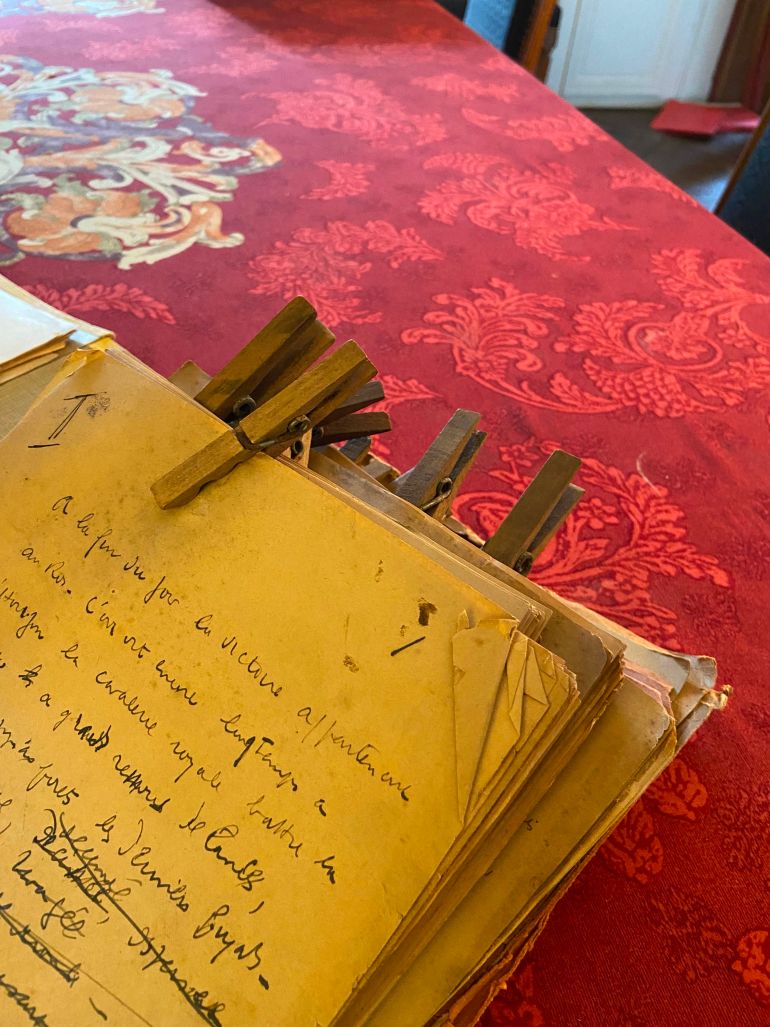Gallimar publishes on May 5 in France an unpublished novel by the famous French writer and doctor Louis Ferdinand Céline (1894 - 1961) entitled "War", after the manuscripts of this story dealing with the First World War remained missing for dozens of years.
"Harb" is based on the famous Selene manuscripts that were found after they were stolen from his home and presented to the public in August 2021.
The publishing house explained that these manuscripts are "a 250-page package containing a novel set in the province of Flanders during the Great War".
She added that it was "a first draft written about two years after the publication of his famous novel (A Journey to the Edge of the Night)," that is, in 1934.
Gallimar highlighted that "Céline reveals in this novel, which combines biography and fiction, the pivotal experience in his life, which is the physical and moral trauma of the front", during the war.
Celine, who was 20 when the First World War broke out, remained affected throughout his life by the horrors of the war in the Belgian Ypres region in 1914, describing it in a "war" as "an international slaughterhouse in a state of madness," according to Gallimar.
In another excerpt from the novel, he wrote, "I've slept like this in the awful noise since December 1914. I've got the war in my head. It's locked in my head."
He was a novelist who collaborated with the Germans during World War II and was known for his hostility to the Jews, and he left this novel among a large group of papers when he left Paris for Germany in June 1944.
Then he learned that his apartment had been broken into and talked about being robbed. The identity of the perpetrators is still unknown to this day.
Recently discovered manuscripts by the French author Louis Ferdinand Céline and include nearly 6,000 unpublished folios (French)
In 2020, the journalist Jean-Pierre Teboda informed the heirs of the writer, who died in 1961, that these manuscripts had been in his possession for about 15 years.
Next fall, Gallimar will publish two other previously unpublished books, one titled "London" about the story of Celine's move to the British capital in 1915, and the second titled "King Krugold's Will," a medieval story.
biography of a french writer
Louis Ferdinand Auguste Destoches was born on May 27, 1894, in Courbevoie, on the outskirts of the French capital, Paris, where he moved to the Opera district.
With his style close to spoken and colloquial language and his verbal innovations, the French novelist turned literature on its head, presenting revolutionary works that glorified the everyday language of literature.
He is known by his nickname "Celine", which he took from his grandmother.
His family descends from the bankrupt petty-bourgeoisie and low-ranking merchants and artisans who cannot realize their dreams and ambitions.
His mother was a lace designer and his father was an insurance company employee.
Celine derived the material of his stories from his poor beginnings, which he likened to "under the bell", in reference to the lighting of the streets of the opera district, which used gas stoves at the time.
He held a few simple jobs before joining the French army in 1912, at the age of 18, and his participation in World War I earned him the Croix de Guerre and the Military Medal.
After the war, Sirene married Edith Follett, then obtained his baccalaureate degree in 1919, and studied medicine until 1924. His thesis was noted for his writing skills.
Before leaving for Geneva, where he was appointed a doctor by the League of Nations, the predecessor of the United Nations, he traveled across continents and learned about Africa with its colonial tragedies, and the economic terror of capitalist America.
The manuscripts disappeared for a long time in a mysterious way and were recently found (French)
Céline then returned to settle in France, where he was recruited to run a dispensary in Clichy, on the outskirts of Paris.
This stable job helped him devote time to his literary inclinations.
Initially, Celine published several plays and some novels that were commercial failures, and then proceeded to publish pamphlets to overcome disappointment, but he did not know that they would be responsible for his future misfortunes.
During the war period, Céline openly supported Nazi Germany and frequented the leaders of the Vichy regime (French loyal to Nazi Germany), and Céline knew that his ideological complicity with the enemy might cost him dearly in liberated France in 1944. Therefore, he took the path of exile with his wife, where he took refuge in Germany, Then to Denmark.
But he was arrested when he arrived in Copenhagen in 1945, to live the most difficult 6 years of his life, divided between prison and freedom.
Then the writer returned to France and wrote 3 novels in which he talked about exile and his journey through defeated Germany, and revived the vein of the autobiographical novel and his social criticism, and Ferdinand Celine lived alone in the Paris suburb of Midoun until he died in 1961.

